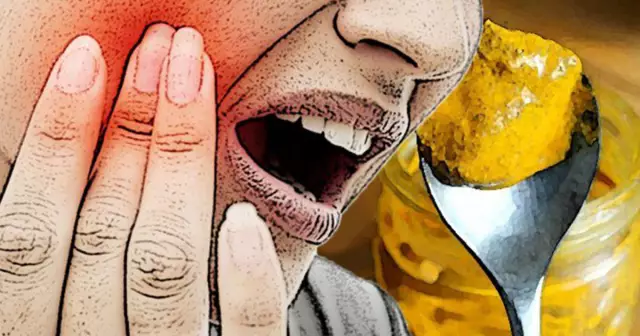- Author Curtis Blomfield blomfield@medicinehelpful.com.
- Public 2023-12-16 20:44.
- Last modified 2025-01-23 17:01.
Toothache usually comes on suddenly and can ruin your plans. It will not be possible to endure this, because after a short pause the pain will return with renewed vigor. Only a dentist can completely save a person from these sufferings, but it is far from always possible to get to him without delay. To alleviate the condition and eliminate the pain syndrome at least for a while, you can use a few tips.
Causes of pain
First of all, you need to find out the cause of the pain, with this in mind, it is much easier to find an effective medicine.

- Caries. The most common cause of pain is precisely the destruction of the tooth under the influence of caries. A complication of this pathology is pulpitis. The latter disease is characterized by damage to the dental nerves, so the pain syndrome is especially strong. Quite often, with pulpitis, even potent drugs do not retain their effect for long, so it makes no sense to postpone going to the dentist for a long time.
- Difficulties with teething wisdom teeth. Protect yourself from such a pathology practicallyimpossible. Even those people who carefully take care of the oral cavity can get into a situation where the wisdom tooth grows and hurts. What to do in this case, traditional medicine will tell you.
- Sinusitis. If there are pain sensations in the anterior part of the upper jaw, it is possible that we are talking about manifestations of sinusitis. This is explained by the fact that the roots of the front upper teeth are located near the maxillary sinuses and respond to inflammation.
- Trigeminal neuralgia. There are times when there is no caries, but the tooth hurts. What to do in this situation? Such signs often appear with trigeminal neuralgia. Discomfort in this case occurs against the background of hypothermia or overwork.
Tooth hurts: what not to do
There are some tips on what not to do. Doing so may increase pain or cause complications.
- You can not warm the sore spot. This rule applies to warm compresses, eating hot food, and any other heat exposure.
- In the supine position, the pain will be felt more. At this time, it is better to sit, stand or do something.
- When eating, do not chew food on the side where the bad tooth is. Such actions may cause a new attack.
Drugs
The easiest answer to the question of what to do if your tooth hurts is to quickly take painkillers. The effect is achieved after 15-30 minutes. Duration of exposure up to 4-6 hours.

In pharmacies there are manydrugs suitable for dental pain relief.
- For mild to moderate pain, doctors recommend medicines Nurofen, Baralgin, Askofen, Spasmalgon.
- Pentalgin, Ketanov, Nimesulide, Ketorol will help relieve severe pain syndrome.
Prenatal medication use
If a pregnant woman has a toothache, doing anything at home should be done very carefully. This is especially true for taking medications. In the list of acceptable medicines: Paracetamol, Analgin, No-shpa, Ibuprofen. Many medicines can only be used during certain periods of pregnancy, it is better to consult a doctor about this. Paracetamol will be the safest option.
It's important to remember: the use of pills is only a temporary measure that will help you wait until the appointment with the dentist. This is explained by the fact that such drugs do not eliminate the cause of the disease, but only block pain. Frequent use of analgesics adversely affects the entire body. In addition, after several doses of tablets, the body adapts and the desired effect is not achieved. In other words, the question of what to do if your teeth and gums hurt remains open.
Mouth rinse
Local exposure can be quite effective. In addition, such folk advice will help to cope with the problem in the absence of medicines.
Saline solution. To prepare it, you need a glass of warm water (not hot) and 1 tsp. s alt. The solution is stirred untiluntil the s alt is completely dissolved. The therapeutic effect is achieved due to the anti-inflammatory properties of s alt. After several such procedures, the intensity of the pain syndrome decreases, redness and inflammation from the gums subside.

Alcohol. Vodka, whiskey, rum or cognac are best suited for this. The action is based on antibacterial and slight anesthetic properties. The procedure will require some alcohol, which should be held in the mouth on the affected side.
Soda solution. This will require a glass of warm boiled water and 1 tsp of soda. This solution eliminates pathogenic bacteria, reduces inflammation. The result is a reduction in symptoms.
Hydrogen peroxide solution. Have you tried many remedies, but your tooth hurts a lot? What to do at home? Almost every home first aid kit has hydrogen peroxide, which will be an effective mouthwash. 50 ml of peroxide is added to 0.5 cups of water and the mouth is rinsed with this liquid. It should be remembered that this medicine is only suitable for external use, it should not be swallowed. Hydrogen peroxide has a negative effect on the mucous membrane of the esophagus and stomach.
Decoction of turnip. This root crop copes well with pain. To do this, take 2 tbsp. l. chopped turnip. You can grind it with a blender or grater. Add the product to 1 tbsp. boiling water and insist covered for about 2 hours. Use as a rinse after cooling.
Any of the above recipes can be safely usedas a standalone remedy or combined with other traditional medicine recipes and medicines.
Sage decoction
As a good pain reliever and anti-inflammatory agent, doctors recommend a decoction of sage. Its advantage lies in its plant origin and the absence of side effects.
To prepare a medicinal decoction, you need 2 tbsp. l. dry chopped sage herb. It can be purchased at every pharmacy. This amount of raw material is poured into 0.5 liters of boiling water. The container is covered with a lid and infused for 2 hours. After that, the broth is filtered and the mouth is rinsed with a slightly warm liquid.
This treatment option is well suited for painful sensations of any origin (complications of caries, painful wisdom teeth, other inflammatory diseases).
Decoction of oak bark
Caries? Climbing a wisdom tooth or gum pain? What to do in these cases? In all these situations, a decoction of oak bark can become a faithful assistant. It has bactericidal and anti-inflammatory properties and has no contraindications.
To prepare the medicine, you will need:
- chopped oak bark - 6 tablespoons;
- cool boiling water - 0.5 l.
Pour raw materials into a container, pour boiling water and put on a slow fire. After the broth boils, the container is removed from the heat and cooled. After straining, use the decoction to rinse your mouth every hour.
This recipe can be tweaked a bit by mixing oak bark with 4 tbsp. l. sage herb.
What canattach
Sometimes there are situations when there are no pills at hand, there is no way to rinse your mouth, and your tooth hurts. What to do in this situation and is there a salvation?
In folk medicine, it is proposed to use various products that have anti-inflammatory, weak analgesic properties. In this case, it is enough to apply a piece of the medicinal product to the affected area.
Raw beets. This useful product effectively relieves pain.
Clove stick. Not everyone will like the taste of this spice, but it relieves the symptoms of inflammation well. The cloves should be chewed lightly beforehand.
Fresh ginger. This product is antimicrobial and may well be used for symptomatic relief.
Lime wedge. To achieve a quick effect, the slice should have as much juice as possible.

Plantain leaves. This plant has been well known for its medicinal properties for decades. It was plantain leaves that were applied to broken knees and bruises. It will also help if your teeth and gums hurt. What to do with leaves? Before applying to the aching gums, they need to be crushed (you can chew a little).
Fresh cucumber. For this purpose, a slice or grated mass is suitable.
Tea Tree Oil
Tea tree oil is a type of essential oil with a pungent odor. This product has high antiviral, antifungal and antibacterial properties. ExceptIn addition, the correct use of oil will help in cases where the gums are swollen and the teeth hurt. What to do with oil? There are several options.

- Appliques. A small piece of cotton is soaked in tea tree oil and applied to a tooth or gum.
- Rinse. For 1 st. warm boiled water add 3-5 drops of oil. After stirring with this liquid, rinse your mouth.
Wisdom teeth
Many people don't even notice the eruption of these posterior teeth, while for others, the eruption period is accompanied by excruciating symptoms. Among the characteristic signs are not only pain, but also high temperature, tissue swelling, redness, difficulty chewing and talking.
It should be noted that in this case, it is not the tooth itself that delivers discomfort, but the soft tissues that are located around it. During eruption, the gums experience a lot of pressure and respond with corresponding symptoms. In this case, doctors diagnose pericoronitis.

Inflammation (when pathogens enter) can join these symptoms. If this happens, the cheek swells up badly and the tooth hurts. In this case, you need to do something as soon as possible. The most correct decision is a visit to the doctor. The fact is that during pericoronitis, the infection spreads very quickly into the deep layers of tissues. The result is blood poisoning (sepsis) and even death.
Wisdom tooth treatment at homeconditions
When a wisdom tooth grows and the gum hurts, doing something at home is not recommended, but sometimes there is no other way out. The fact is that pericoronitis is often characterized by a rapid onset of symptoms, so not everyone will be able to go to the doctor right away.
You will have to act actively immediately, as pain and redness of the surrounding soft tissues significantly reduce the quality of human life. Talking and eating will be difficult. You can alleviate the condition a little in many ways.
Medications. As with normal toothache caused by caries, the manifestations of pericoronitis can be temporarily relieved with analgesics.

Folk remedies. You can use products for applications, rinses and compresses with the use of medicines.
Important! It is strictly forbidden to warm the cheek and gum.
Manifestations of sinusitis and trigeminal neuralgia
Many people wonder what to do when a tooth hurts and a cheek is swollen for no apparent reason? Typically, these symptoms indicate other diseases in which gum inflammation and pain act as a complication.
To eliminate the cause, you will need to consult not only a dentist, but also other narrow specialists.
If it is trigeminal neuralgia, then the neurologist will deal with the treatment.
If it is sinusitis, you can not do without a visit to the otolaryngologist.
The article collected all the most effective recipes to help cope with pain in dentalproblems. A person who knows at least a few of the above methods will not experience difficulties with toothache. The most important thing is not to let the disease take its course and go to the doctor as soon as possible. This approach will save you from serious complications.






